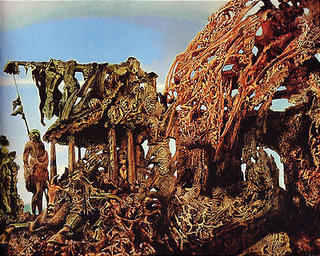
SCIENCE FRICTION
As an adolescent I read a staggering amount of genre science fiction-- great, good, middling and horrible. I started out with staples of the genre like Asimov and Heinlein. I then moved on to Philip K. Dick, then published in cheesy bug-eyed paperback editions back before he was hailed by academics as a prophet of postmodernism and hailed by Hollywood as source material for screenplays (this all happened after his death unfortunately). Jonathan Lethem was reading him at the same time, but took his obsession further, tattooing the original paperback graphic of UBIK on his arm. Here's his perceptive essay on PKD.
Another writer that blew my mind as a young man was J.G. Ballard. His weird disturbing disaster novels were like nothing I'd read before. I haunted the used paperback shops looking for his books with their surrealist covers like the Max Ernst painting above-- they seemed more sophisticated and strange than the more typical literal SF rockets and ray gun cover art. One of the few SF writers I still regularly read, Bruce Sterling, gives his take on Ballard in an interesting interview where he discusses Ballard's influence on his generation of SF writers, why Ballard is better than Burroughs, and the false dichotomy of optimism and pessimism in the genre. Here's a taste:
To me these late-Ballard pieces, these Shepperton pieces – Cocaine Nights, Super-Cannes and so forth – really seem like gentle chiding from somebody who’s recognized that his civilisation really has gone mad. They’re a series of repetitions that say, “Look, we’re heading for a world where consensus reality really is just plain unsustainable, and the ideas that the majority of our people hold in their heart of hearts are just not connected to reality”. I think that may be a very prophetic assessment on his part. I think we may in fact be in such a world right now – where people have really just lost touch with the “reality-based community” and are basically just living in self-generated fantasy echo chambers that have no more to do with the nature of geopolitical reality than Athanasius Kircher or Castaneda’s Don Juan.
Also: J.G. Ballard reviews The History of Violence, the new film by David Cronenberg, who earlier did the film version of Ballard's own novel Crash.


1 Comments:
This comment has been removed by a blog administrator.
Post a Comment
<< Home